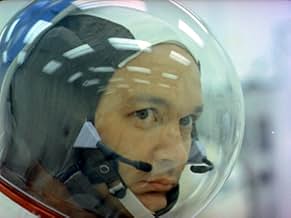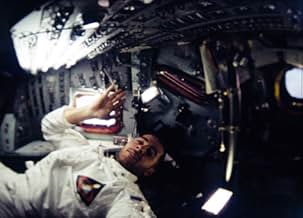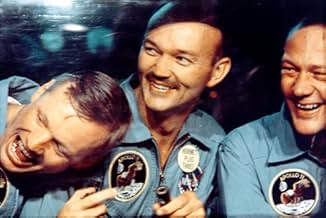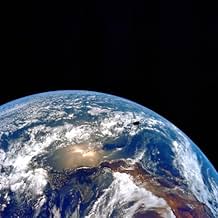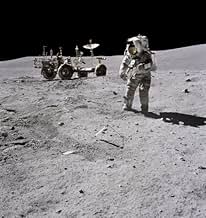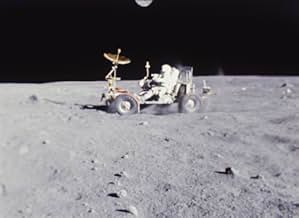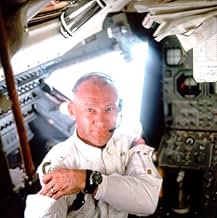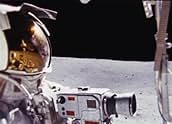IMDb-BEWERTUNG
8,0/10
7049
IHRE BEWERTUNG
Die Besatzungsmitglieder der Apollo-Missionen der NASA erzählen ihre Geschichte in ihren eigenen Worten.Die Besatzungsmitglieder der Apollo-Missionen der NASA erzählen ihre Geschichte in ihren eigenen Worten.Die Besatzungsmitglieder der Apollo-Missionen der NASA erzählen ihre Geschichte in ihren eigenen Worten.
- Auszeichnungen
- 6 Gewinne & 13 Nominierungen insgesamt
Jim Lovell
- Self
- (as James Lovell)
Edgar D. Mitchell
- Self
- (as Edgar Mitchell)
Dave Scott
- Self
- (as David Scott)
William Anders
- Self
- (Archivfilmmaterial)
Neil Armstrong
- Self
- (Archivfilmmaterial)
Stephen Armstrong
- Self
- (Archivfilmmaterial)
Viola Armstrong
- Self
- (Archivfilmmaterial)
Jules Bergman
- Self
- (Archivfilmmaterial)
Frank Borman
- Self
- (Archivfilmmaterial)
Roger B. Chaffee
- Self
- (Archivfilmmaterial)
Yuri Gagarin
- Self
- (Archivfilmmaterial)
Empfohlene Bewertungen
This recently-released documentary had some fantastic footage in it, and a very personal look at many of the astronauts who went to the moon. Overall, that is a very exclusive club: only about a dozen men ever did it in the history of the world and just eight or nine ever stepped foot on it. Most of them are still alive and they discuss their adventures, insights and personal feelings here.
One gets the feeling that the rest of us will never know exactly how beautiful the moon is except to take the astronauts' words about it, because even the pictures on this DVD can't convey that. It just looks dull and gray, but the men say it was spectacular. I believe them.
Since this documentary is about 100 minutes long, you get a lot of information. You also get reminded how close two of the three men who went up on that historic first walk on the moon almost didn't get home alive.
A glaring absence in this documentary - through no fault of the film-makers, is the most famous astronaut of them all: Neil Armstrong, the first man to step foot on the moon! Apparently, he did not want to be part of this film. One of the astronauts, near the very end of this documentary, mentions something briefly about Armstrong being somewhat of a "recluse" now and it "being understandable with what he's gone through." From what I've read, a lot of people have tried to make money off him in shady ways and so now he's withdrawn from the public spotlight. Still, not having his thoughts on this historic mission is a real loss to this film and makes this story seem incomplete.
After a slow first half hour, this really picks up when we travel along with Armstrong's Apollo 11 crew. Seeing slow-motion pictures of the lift-off and great shots of the earth are just awesome. The worldwide reaction to the success of this mission will bring a tear or two to your eyes.
This film, a legacy to the Apollo program and the brave men who ran it, should be in every schoolroom. It would make history a lot more interesting to students.
One gets the feeling that the rest of us will never know exactly how beautiful the moon is except to take the astronauts' words about it, because even the pictures on this DVD can't convey that. It just looks dull and gray, but the men say it was spectacular. I believe them.
Since this documentary is about 100 minutes long, you get a lot of information. You also get reminded how close two of the three men who went up on that historic first walk on the moon almost didn't get home alive.
A glaring absence in this documentary - through no fault of the film-makers, is the most famous astronaut of them all: Neil Armstrong, the first man to step foot on the moon! Apparently, he did not want to be part of this film. One of the astronauts, near the very end of this documentary, mentions something briefly about Armstrong being somewhat of a "recluse" now and it "being understandable with what he's gone through." From what I've read, a lot of people have tried to make money off him in shady ways and so now he's withdrawn from the public spotlight. Still, not having his thoughts on this historic mission is a real loss to this film and makes this story seem incomplete.
After a slow first half hour, this really picks up when we travel along with Armstrong's Apollo 11 crew. Seeing slow-motion pictures of the lift-off and great shots of the earth are just awesome. The worldwide reaction to the success of this mission will bring a tear or two to your eyes.
This film, a legacy to the Apollo program and the brave men who ran it, should be in every schoolroom. It would make history a lot more interesting to students.
And I mean it. The footage and stories in this movie were like nothing I've ever seen. Nor have many others because this film includes new footage and stories of the Apollo space missions never seen nor heard. I went to an advance screening at the Sarasota Film Festival and I was extremely impressed as was the rest of the crowd. There was a very long standing ovation at the end of the movie. The film includes at least one member from each of the Apollo missions telling there stories of the process they went through while preparing to land on the moon. It contains the remarkable footage filmed by the crew members of each mission. If you truly want to be left see a movie that will leave you full of excitement and amaze you must see this movie. The host of the film said this film was the reason movies should be made and he was nothing short of the truth.
The Apollo moon landings of the late 1960's and early 1970's have been the subject of countless documentaries over the nearly forty years since they occurred. Of all of them, only two films have captured the spirit of Apollo and of the men who took the journey. One of them is Al Reinert's 1989 masterpiece For All Mankind. The other is this film: In The Shadow Of The Moon. And this film easily rivals For All Mankind for the position of best Apollo documentary.
This film takes the idea behind For All Mankind and takes it to the next level. For All Mankind showed us the astronauts as they were then with narration from interviews. In The Shadow Of The Moon, as I wrote, goes the next step further. It shows the astronauts not only as they were, but as they are now. The difference is often times amazing. To go from young fighter pilot to being one of the few men to have left our planet must have been an amazing journey as the film shows and these men prove it. Like For All Mankind, their narration and appearances are the heart and soul of the story being told.
The body of the story is the footage. Where as For All Mankind brilliantly combined all the footage into one large mission, this film doesn't to a degree. It shows us highlights from the program including Apollo 8 and Apollo 11 and then makes a conscience effort not to confuse missions together. This allows for clarity that many have complained about being missing from For All Mankind. But this clarity also allows for something else as well. It allows for depth in story.
That depth can be felt. The truly great thing about this film is that these images, which so many of us are use to seeing on a small television screen, are shown on a big screen. Only on a big screen can one see and feel the depth of the journey that was Apollo. The film has the ability to take images seen many times and bring context and emotion to them. In particular, the footage and still images of the Earth as taken by the astronauts is awe-inspiring. In fact, seeing the famous Earth-rise image from Apollo 8 brought me to tears. And for once, I am not ashamed to admit it.
To be frank, In The Shadow Of The Moon is an amazing piece of work. Not since For All Mankind as a film of any size, shape, or form captured the spirit of Apollo. This is a film about a dream, the men who lived it, and its legacy not only for them but for us as well. I beg you to see this film. Only after that and viewing For All Mankind can one understand not only the legacy of Apollo but our need to explore Space.
This film takes the idea behind For All Mankind and takes it to the next level. For All Mankind showed us the astronauts as they were then with narration from interviews. In The Shadow Of The Moon, as I wrote, goes the next step further. It shows the astronauts not only as they were, but as they are now. The difference is often times amazing. To go from young fighter pilot to being one of the few men to have left our planet must have been an amazing journey as the film shows and these men prove it. Like For All Mankind, their narration and appearances are the heart and soul of the story being told.
The body of the story is the footage. Where as For All Mankind brilliantly combined all the footage into one large mission, this film doesn't to a degree. It shows us highlights from the program including Apollo 8 and Apollo 11 and then makes a conscience effort not to confuse missions together. This allows for clarity that many have complained about being missing from For All Mankind. But this clarity also allows for something else as well. It allows for depth in story.
That depth can be felt. The truly great thing about this film is that these images, which so many of us are use to seeing on a small television screen, are shown on a big screen. Only on a big screen can one see and feel the depth of the journey that was Apollo. The film has the ability to take images seen many times and bring context and emotion to them. In particular, the footage and still images of the Earth as taken by the astronauts is awe-inspiring. In fact, seeing the famous Earth-rise image from Apollo 8 brought me to tears. And for once, I am not ashamed to admit it.
To be frank, In The Shadow Of The Moon is an amazing piece of work. Not since For All Mankind as a film of any size, shape, or form captured the spirit of Apollo. This is a film about a dream, the men who lived it, and its legacy not only for them but for us as well. I beg you to see this film. Only after that and viewing For All Mankind can one understand not only the legacy of Apollo but our need to explore Space.
10Kwp
There have been many documentaries about the technical issues of getting to the Moon, but this one focuses more on how the astronauts felt about it all. At turns funny (Buzz Aldrin admits he relieved himself right before stepping on the Moon because it was about the only spare time he was going to have for the next two hours), inspiring (Jim Lovell talking about reading from Genesis while orbiting the Moon), and poignant (several of the astronauts talk about the Apollo 1 fire), it's a riveting piece of film-making.
The footage itself switches between the "talking heads" of the astronauts and imagery depicting what they're talking about, loosely following the chronology of the space age, from Kennedy's declaration of the ambition to go to the Moon to the later Apollo missions with the lunar rover. There aren't any revelations in the mission footage, but then all that's been combed over many times. However, it's well put together and everything is tied in.
I got to see this film at a special showing at the Goddard Space Flight Center. When the film was over, the auditorium full of space geeks gave the director a standing ovation. I think it was well-deserved. While he humbly noted "It's you rocket scientists who really did this - I just put a film together," perhaps - as he also noted - this film will help inspire another generation as we take the next great leap into space, this time to Mars.
The footage itself switches between the "talking heads" of the astronauts and imagery depicting what they're talking about, loosely following the chronology of the space age, from Kennedy's declaration of the ambition to go to the Moon to the later Apollo missions with the lunar rover. There aren't any revelations in the mission footage, but then all that's been combed over many times. However, it's well put together and everything is tied in.
I got to see this film at a special showing at the Goddard Space Flight Center. When the film was over, the auditorium full of space geeks gave the director a standing ovation. I think it was well-deserved. While he humbly noted "It's you rocket scientists who really did this - I just put a film together," perhaps - as he also noted - this film will help inspire another generation as we take the next great leap into space, this time to Mars.
10se7en187
I saw this at the Traverse City Film Festival and it was quite the thrill.
Another great documentary about the Apollo program and the astronauts that went to the moon. Some very interesting and inspiring interviews including incredible actual footage of the Apollo 11 mission as it traveled from the Earth to the Moon.
The film contains interviews from many of the astronauts, Mike Collins (the astronaut from Apollo 11 that didn't walk on the moon) was probably the highlight, he was so funny and entertaining. I was a little disappointed that Neil Armstrong wasn't interviewed, but oh well, it was still very good.
Captivating, fun, and an excellent score, I'm sure people will enjoy this well made film.
Another great documentary about the Apollo program and the astronauts that went to the moon. Some very interesting and inspiring interviews including incredible actual footage of the Apollo 11 mission as it traveled from the Earth to the Moon.
The film contains interviews from many of the astronauts, Mike Collins (the astronaut from Apollo 11 that didn't walk on the moon) was probably the highlight, he was so funny and entertaining. I was a little disappointed that Neil Armstrong wasn't interviewed, but oh well, it was still very good.
Captivating, fun, and an excellent score, I'm sure people will enjoy this well made film.
Wusstest du schon
- WissenswertesOf all the astronauts who appeared in the film, only Buzz Aldrin demanded to be paid.
- PatzerThe 1202 alarm was not a programming error in the Apollo Guidance Computer, but rather a hardware design bug, already documented by Apollo 5 engineers. Since the 1202 alarm had occurred only once during testing, NASA decided to go with the radar hardware with known problems instead of using untested newer alternatives with unknown problems.
- Zitate
Jim Lovell: We changed our plans on Apollo 8. They changed the mission from an Earth orbital type to a flight to the Moon. And it was a bold move. It had some risky aspects to it. But it was a time when we made bold moves.
- VerbindungenAlternate-language version of Universum: Im Schatten des Mondes (2009)
Top-Auswahl
Melde dich zum Bewerten an und greife auf die Watchlist für personalisierte Empfehlungen zu.
Details
- Erscheinungsdatum
- Herkunftsländer
- Offizielle Standorte
- Sprachen
- Auch bekannt als
- In the Shadow of the Moon
- Produktionsfirmen
- Weitere beteiligte Unternehmen bei IMDbPro anzeigen
Box Office
- Budget
- 2.000.000 $ (geschätzt)
- Bruttoertrag in den USA und Kanada
- 1.134.358 $
- Eröffnungswochenende in den USA und in Kanada
- 38.281 $
- 9. Sept. 2007
- Weltweiter Bruttoertrag
- 2.161.369 $
- Laufzeit1 Stunde 40 Minuten
- Farbe
- Sound-Mix
- Seitenverhältnis
- 1.85 : 1
Zu dieser Seite beitragen
Bearbeitung vorschlagen oder fehlenden Inhalt hinzufügen






